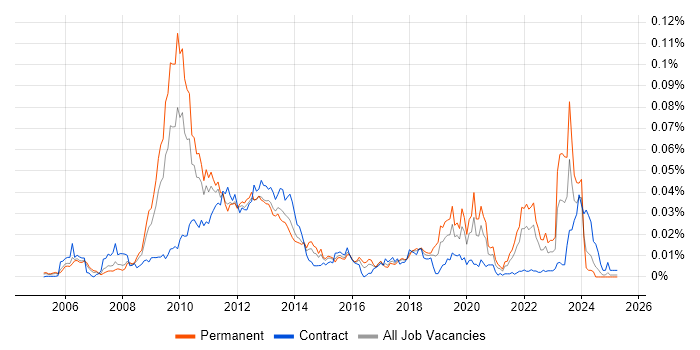OpenGL for Embedded Systems (OpenGL ES)
UK > England
The table below provides summary statistics and salary benchmarking for jobs advertised in England requiring OpenGL ES skills. It covers permanent job vacancies from the 6 months leading up to 24 November 2025, with comparisons to the same periods in the previous two years.
| 6 months to 24 Nov 2025 |
Same period 2024 | Same period 2023 | |
|---|---|---|---|
| Rank | 611 | - | 643 |
| Rank change year-on-year | - | - | +382 |
| Permanent jobs citing OpenGL ES | 1 | 0 | 42 |
| As % of all permanent jobs in England | 0.002% | - | 0.091% |
| As % of the Libraries, Frameworks & Software Standards category | 0.016% | - | 0.34% |
| Number of salaries quoted | 1 | 0 | 2 |
| 10th Percentile | - | - | - |
| 25th Percentile | - | - | £65,000 |
| Median annual salary (50th Percentile) | £100,000 | - | £67,500 |
| Median % change year-on-year | - | - | -15.63% |
| 75th Percentile | - | - | £72,500 |
| 90th Percentile | - | - | £74,000 |
| UK median annual salary | £100,000 | - | £67,500 |
| % change year-on-year | - | - | -15.63% |
All Software Libraries and Frameworks
England
OpenGL ES falls under the Software Libraries and Frameworks category. For comparison with the information above, the following table provides summary statistics for all permanent job vacancies requiring technical specification, industry standards, software libraries and framework skills in England.
| Permanent vacancies with a requirement for technical specification, industry standards, software libraries and framework skills | 6,302 | 12,559 | 12,289 |
| As % of all permanent jobs advertised in England | 13.64% | 20.73% | 26.56% |
| Number of salaries quoted | 4,732 | 7,583 | 10,157 |
| 10th Percentile | £36,250 | £40,000 | £41,250 |
| 25th Percentile | £50,000 | £50,000 | £51,250 |
| Median annual salary (50th Percentile) | £67,500 | £65,000 | £67,500 |
| Median % change year-on-year | +3.85% | -3.70% | - |
| 75th Percentile | £86,750 | £85,000 | £87,500 |
| 90th Percentile | £115,000 | £110,000 | £110,000 |
| UK median annual salary | £67,500 | £65,000 | £65,900 |
| % change year-on-year | +3.85% | -1.36% | +1.38% |
OpenGL ES
Job Vacancy Trend in England
Historical trend showing the proportion of permanent IT job postings citing OpenGL ES relative to all permanent IT jobs advertised in England.

OpenGL ES
Salary Trend in England
Salary distribution trend for jobs in England citing OpenGL ES.

OpenGL ES
Job Locations in England
The table below looks at the demand and provides a guide to the median salaries quoted in IT jobs citing OpenGL ES within the England region over the 6 months to 24 November 2025. The 'Rank Change' column provides an indication of the change in demand within each location based on the same 6 month period last year.
| Location | Rank Change on Same Period Last Year |
Matching Permanent IT Job Ads |
Median Salary Past 6 Months |
Median Salary % Change on Same Period Last Year |
Live Jobs |
|---|---|---|---|---|---|
| East of England | - | 1 | £100,000 | - | 1 |
| OpenGL ES UK |
|||||
OpenGL ES
Co-Occurring Skills & Capabilities in England by Category
The following tables expand on the one above by listing co-occurrences grouped by category. They cover the same employment type, locality and period, with up to 20 co-occurrences shown in each category:
|
|
||||||||||||||||||
|
|||||||||||||||||||
